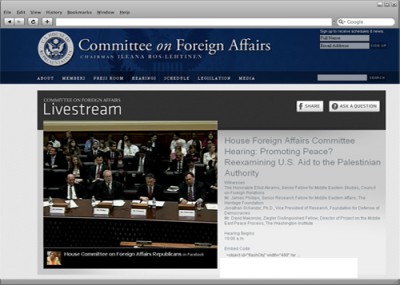 A bipartisan group of lawmakers sent Palestinian Authority officials a powerful message Tuesday: There will be severe consequences for any attempt to have the United Nations recognize an independent Palestinian state based on Israel's June 4, 1967 borders.
A bipartisan group of lawmakers sent Palestinian Authority officials a powerful message Tuesday: There will be severe consequences for any attempt to have the United Nations recognize an independent Palestinian state based on Israel's June 4, 1967 borders.
That could range from the closing of Palestine Liberation Organization offices in Washington and other diplomatic actions, to a full cutoff of American foreign aid to the Palestinian Authority (PA). Such a unilateral action violates the 18-year-old Oslo Accords, brokered by the United States, which call for direct negotiations to resolve any conflict.
In testimony delivered at House Foreign Affairs Committee hearing, witnesses noted that three-quarters of the PA budget comes from value-added tax collections remitted by Israel along with foreign aid, much of which comes from the United States. Washington has provided more than $4 billion in bilateral aid to the Palestinians since the 1993 Oslo Accords. In this fiscal year, U.S. aid is set at $550 million - $400 million in economic assistance and $150 million for equipping and training Palestinian security forces.
Others suggested cutting off American funding for any United Nations program that recognizes the Palestinian state.
Rep. Dana Rohrabacher, R-Cal., who has been sharply critical of Israeli policies in the past, said Israel has made important concessions for peace such as accepting the creation of a Palestinian state and recognizing the need to relinquish territory. Yet rockets continue to be fired into Israel from Gaza, and the Palestinians refuse to give up the "right of return" to their families' previous homes in Israel (which Israelis regard as a formula for the destruction of the Jewish State). And the PA continues to print and broadcast incendiary anti-Semitic hatred, applaud murderous terrorist acts against Israel and publish anti-Semitic screeds in children's textbooks.
"I can't see what the Palestinians have given up," Rohrabacher said. U.S. assistance to the PA seems to be aimed at making ourselves "feel good" rather than advancing U.S. policy goals such as Middle East peace.
Committee Democrats sounded similar themes.
Rep. Eliot Engel, D-N.Y., said that by going to the UN instead of negotiating with Israel, Authority Chairman Mahmoud Abbas is violating Oslo and UN Security Council Resolution 242, both of which call for a negotiated settlement of the Israeli-Palestinian conflict. "This is not land for peace. It's land for nothing," he said. "Where is Israel's peace in all of this?"
Democrats and Republicans on the committee criticized the Obama administration for being slow and ineffective in responding to the Palestinian gambit. It's the latest in a series of policy errors, dating back to its emphasis on a settlement freeze as a starting point for peace negotiations, they said.
"When the president talks of settlements and '67 lines, it's not helpful," Engel said. "It gives the Palestinians one more excuse not to talk to Israel."
Supporters of a two-state solution oppose the move because they also "believe that people have to live with the consequences of their actions," said Rep. Gary Ackerman, D-N.Y. He indicated that a total cutoff of U.S. assistance to the PA might be warranted and suggested that the Palestinians should seek assistance from the U.N. if they continue to pursue their current course.
Testimony before the committee placed blame for the current situation squarely on Abbas, who has failed to tackle endemic corruption and has worked to undermine PA Prime Minister Salaam Fayyad, who has tried to create some financial accountability and opposed Abbas' efforts to declare statehood unilaterally.
But "Fayyad has been sidelined" by Abbas, who "has consolidated power, and… is now abusing it," said Jonathan Schanzer of the Foundation for the Defense of Democracies.
One particularly egregious example is the Palestine Investment Fund, created in 2002 to manage and allocate money and commercial interests owned by the PA. Abbas changed the charter, put his own people on the board and neglected to audit it. There are allegations that more than $1 billion is missing from the fund.
Another problem, Schanzer said, is the PA's "ambiguous" relationship with Hamas. The PA has secretly permitted Hamas to raise funds through an "electricity scam" in which electricity in Gaza is produced by a power plant guaranteed by the Palestinian Authority, with the bills being collected by Hamas. In July, a former PA advisor told Schanzer that Hamas authorities collect the bills from customers in Gaza but fail to send the funds back to the West Bank.
"In other words, Abbas allows Hamas to raise funds by billing Gazans for electricity they don't generate. And because the PA is funded by U.S. taxpayer money, we are all enabling Hamas to raise these funds," Schanzer testified.
Hamas officials, meanwhile, oppose the UN ploy, saying "it will cement the Palestinians' recognition of Israel's right to exist," which goes against Hamas's absolute goal of destroying the Jewish state.
Meanwhile the PLO's ambassador to the United States said Tuesday that any Palestinian state should be free of Jews. "After the experience of the last 44 years of military occupation and all the conflict and friction, I think it would be in the best interest of the two people[s] to be separated," said Maen Areikat, the PLO ambassador.
Such a state would be the first to officially prohibit Jews or any other faith since Nazi Germany, said former National Security Council official Elliott Abrams, now a senior fellow with the Council on Foreign Relations.



 PA Documents Detail Payments to Terrorists
PA Documents Detail Payments to Terrorists